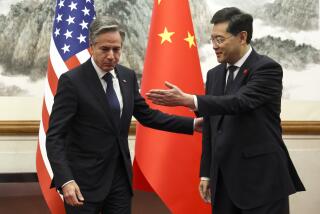China Will Welcome 3 Human Rights Monitors, U.S. Envoy Says
- Share via
BEIJING — The Chinese government will invite three U.N. human rights officials to China to conduct unrestricted investigations, a senior U.S. diplomat said Tuesday, in a policy reversal long sought by rights groups.
After two days of talks here, Assistant Secretary of State Lorne Craner cited the invitations as evidence of expanded cooperation by China on human rights issues. Beijing had not publicly confirmed the invitations.
According to Craner, China said it would welcome Theo van Boven, the U.N. special envoy on torture, who has been invited before but without the promise of unmonitored interviews with prisoners. China will also issue invitations on unconditional terms to the U.N. envoys on religion and arbitrary detention, Craner said.
“We understand the terms they want when they come here,” he said of the U.N. officials. “That’s what they will get.”
Beijing routinely rejects allegations of human rights abuses such as torture but has engaged in dialogue on the issue with the U.S. and European Union since the mid-1990s.
With economic interdependence and cooperation in the war on terrorism bonding Beijing and Washington in an uneasy partnership, the exchange of official delegations appears to be accelerating, and human rights diplomacy is becoming increasingly routine.
“It’s meetings and trips,” Craner said of the progress. “I can’t see too much that has substantially changed. But three years from now, we may look back and see that this was the time when the ice started to break.”
Chinese Foreign Ministry spokesman Liu Jianchao said this week’s human rights talks were “in-depth and extensive, narrowed the differences between the sides and enhanced understanding.”
International human rights groups have dismissed the U.S.-China rights dialogue as ineffectual and have urged Craner to press for the release of imprisoned religious leaders and dissidents.
Craner also met with officials from the Justice Ministry and the Religious Affairs Bureau to discuss legal reforms and religious freedoms.
Today, Craner’s delegation was scheduled to visit the western region of Xinjiang, where China claims to be helping the U.S.-declared war on terrorism by cracking down on minority Muslim separatists. In August, Washington put the East Turkestan Islamic Movement, which Beijing has proscribed, on its list of terrorist groups.
Craner is expected to remind his hosts that Washington’s move did not constitute carte blanche to persecute Chinese Muslims for legitimate grievances against Beijing’s rule.
Craner also met with Vice Foreign Minister Li Zhaoxing and top human rights diplomat Li Baodong, both of whom are widely credited with engineering the release of political prisoners whose cases were raised by Washington.
U.S. diplomats now work from two lists of “cases of concern,” one for Chinese prisoners of conscience and one for U.S. citizens imprisoned in China. This year, Chinese authorities have released three Tibetan prisoners -- a teacher, a nun and an ethnomusicologist -- as well as Los Angeles-area businessman David Chow, all of whom were on the lists.
Chinese officials have also begun to cultivate relations with Washington’s special coordinator for Tibet, Paula J. Dobriansky. Whereas Beijing refused to speak with her predecessors, they have welcomed her three times to China in recent years, all in her other official capacity as undersecretary of State for global affairs.
Dobriansky works closely with the Dalai Lama’s envoy to Washington, Lodi Gyari, who traveled to Beijing this year in the first visit in two decades by an official representative of the exiled spiritual leader of Tibet and Nobel Peace Prize winner.
More to Read
Sign up for Essential California
The most important California stories and recommendations in your inbox every morning.
You may occasionally receive promotional content from the Los Angeles Times.













